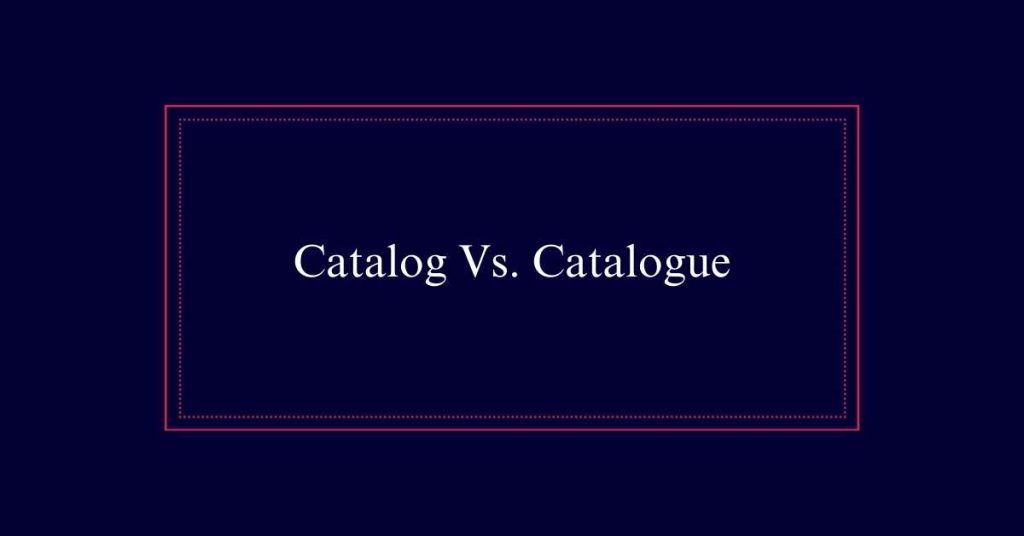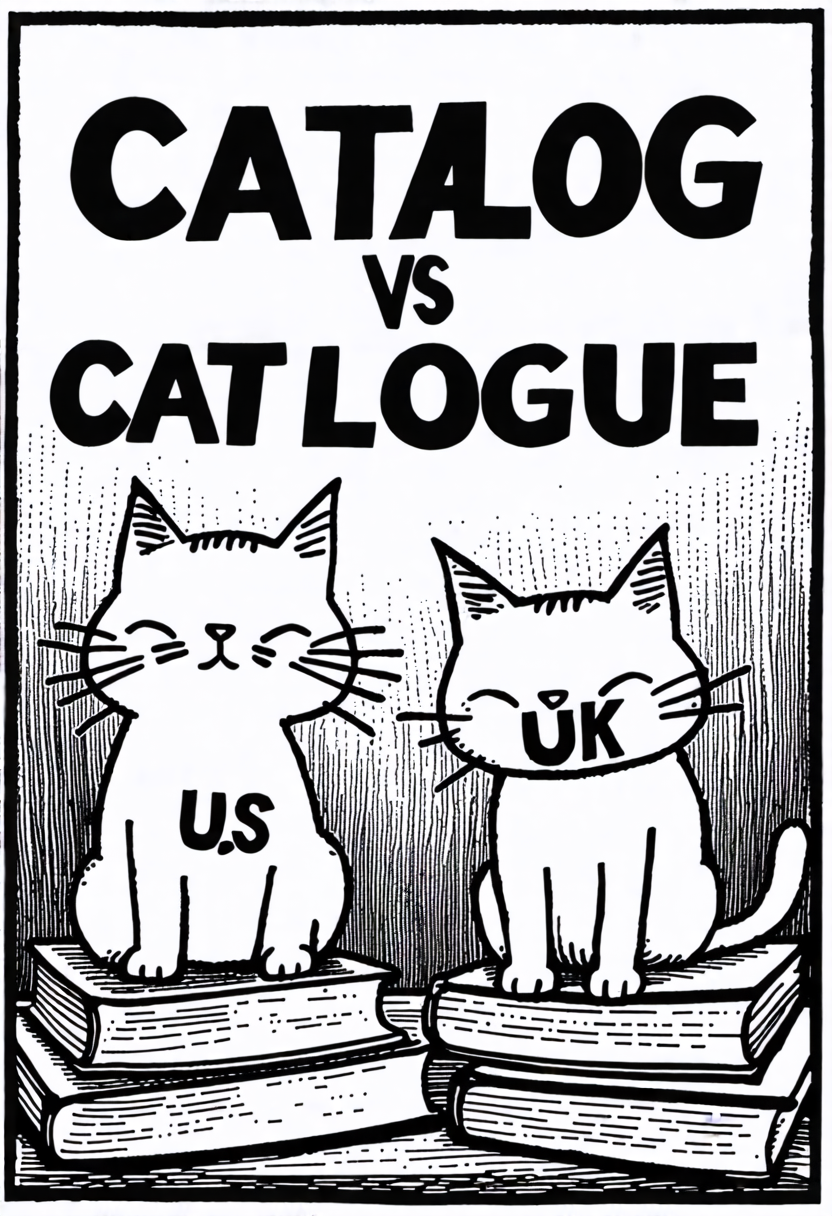Catalog Vs. Catalogue
Both ‘catalog’ and ‘catalogue’ are correct. ‘Catalog’ is preferred in American English, while ‘catalogue’ is commonly used in British English and Canada. The choice between these spellings often depends on your target audience.
Regional Spelling Preferences
In the domain of English language usage, regional preferences heavily influence the choice between ‘catalog’ and ‘catalogue.’
In the United States, ‘catalog’ is the favored spelling. However, in other English-speaking regions, such as the United Kingdom and Canada, ‘catalogue’ is more commonly used.
This distinction extends beyond mere spelling; it reflects broader linguistic trends. For writers and businesses, understanding these preferences is vital. Choosing the correct spelling can improve communication with the intended audience.
It is essential to take into account the regional norms when deciding whether to use ‘catalog’ or ‘catalogue.’ Both forms are grammatically correct, but the choice should align with the reader’s expectations to ensure clarity and professionalism.
American English Simplifications
Why does American English often simplify spellings such as dropping the -ue ending in words like ‘catalog’? The rationale behind this simplification is to make language use more straightforward and efficient.
Noah Webster, an influential figure in American lexicography, advocated for simpler spellings in his dictionaries to promote literacy. By removing unnecessary letters, words become easier to spell and pronounce. This trend towards simplification can be seen in other words like ‘analog’ and ‘dialog.’
The goal is to create a more streamlined and accessible form of English. This approach not only aids in learning but also reflects a broader cultural preference for practicality and efficiency in written communication.
Examples of Usage
The simplification of spellings in American English, like dropping the -ue in ‘catalogue,’ can be illustrated through various practical examples.
For instance, the McKinney Public Library upgraded to the Koha online catalog system, demonstrating its use in public services.
Neiman Marcus adapted its catalog to appeal to millennials, showing its application in retail marketing.
The 2016 ABC Best Books for Young Readers catalog is available for order on BookWeb, highlighting its role in publishing.
These examples show ‘catalog’ being used in libraries, retail, and publishing.
The term ‘cataloguing’ also appears in professional settings, such as libraries, where it involves detailed data entry within MARC records.
Catalog in the U.S
American businesses and institutions frequently adopt the simplified ‘catalog’ spelling to streamline communication and align with local linguistic norms. This preference aligns with the broader trend in American English of simplifying word endings, as seen with other terms like ‘analog’ and ‘dialog.’
The streamlined spelling makes written communication more efficient and accessible. For instance, libraries and retailers in the U.S. use ‘catalog’ in their systems and marketing materials to maintain consistency. This approach helps prevent confusion and preserves clarity for the American audience.
Additionally, digital and print catalogs benefit from the shorter spelling, making them easier to manage and distribute. As such, ‘catalog’ has become the standard in the U.S. for both practical and linguistic reasons.

Catalogue in Other Countries
While ‘catalog’ is the norm in the U.S., ‘catalogue’ retains its prevalence in other English-speaking countries. In the United Kingdom, Canada, and Australia, ‘catalogue’ is the preferred spelling. This preference aligns with traditional British English, which often includes the -ue ending in words.
The use of ‘catalogue’ is consistent in various official documents, educational materials, and publications. For example, libraries in these countries frequently use ‘catalogue’ to describe their collections. Additionally, many businesses and retailers in these regions produce product catalogues for their customers.
Impact on Readership
Choosing between ‘catalog’ and ‘catalogue’ can greatly influence how readers perceive your content. The choice can affect readability, audience engagement, and perceived professionalism. Readers in the United States may find ‘catalog’ more familiar and therefor more approachable. Conversely, international readers might expect ‘catalogue’ and perceive it as more formal or traditional.
| Region | Preferred Spelling | Reader Perception |
|---|---|---|
| United States | ‘Catalog’ | Familiar, approachable |
| United Kingdom | ‘Catalogue’ | Formal, traditional |
| Canada | ‘Catalogue’ | Standard, expected |
| Australia | ‘Catalogue’ | Conventional, accepted |
Historical Evolution
Understanding how ‘catalog’ and ‘catalogue’ evolved over time provides insight into their current usage and regional preferences.
The word ‘catalogue’ originated from the Greek word ‘katalogos’, meaning a list or register.
Over centuries, the British spelling ‘catalogue’ became standard in the UK and other Commonwealth countries.
However, the American spelling ‘catalog’ emerged in the early 19th century, reflecting a trend towards simpler spellings.
Common Contexts
In various contexts, both ‘catalog’ and ‘catalogue’ are used to denote a systematic list or record of items. Libraries often employ an online catalog or catalogue to help users locate books and resources.
Retail businesses use product catalogs or catalogues to showcase their offerings. Educational institutions maintain course catalogs or catalogues to inform students about available classes and programs.
Museums and galleries create exhibition catalogs or catalogues to provide detailed information on displays. In each scenario, the term can also refer to digital or printed formats.
Whether organizing data, products, or collections, ‘catalog’ and ‘catalogue’ serve the same essential function: to systematically present information in an accessible manner. This usage is consistent across various industries and fields.
Influence of Audience Location
When deciding between ‘catalog’ and ‘catalogue,’ the location of your audience plays a significant role. Understanding regional spelling preferences helps in crafting content that resonates with your readers.
American English favors ‘catalog,’ while other English-speaking regions lean towards ‘catalogue.’
Here are key considerations:
- Regional Preferences: Use ‘catalog’ for American audiences and ‘catalogue’ for British, Canadian, and Australian readers.
- Audience Perception: Aligning with local norms builds trust and credibility.
- Professional Standards: Certain industries may have preferred spellings based on location.
- Consistency: Maintain consistent spelling throughout your content to avoid confusion.







